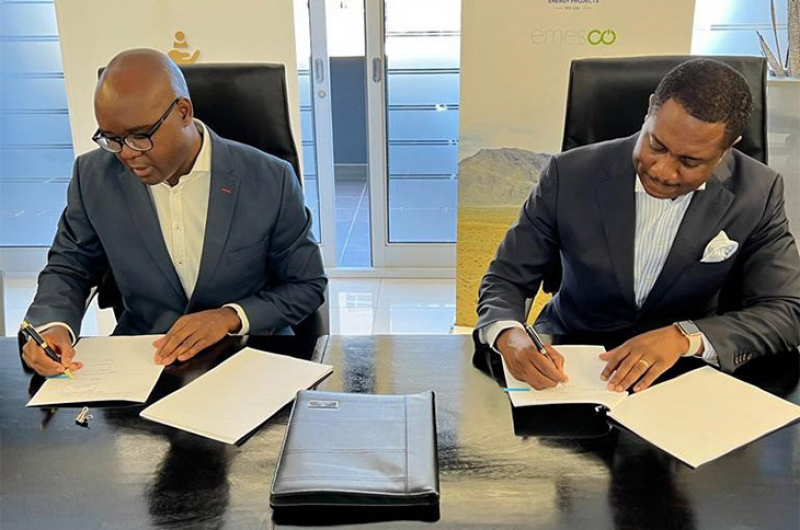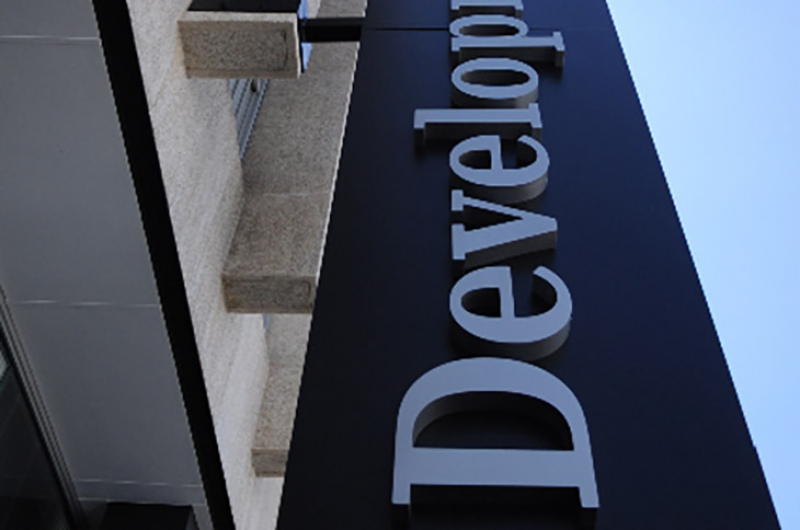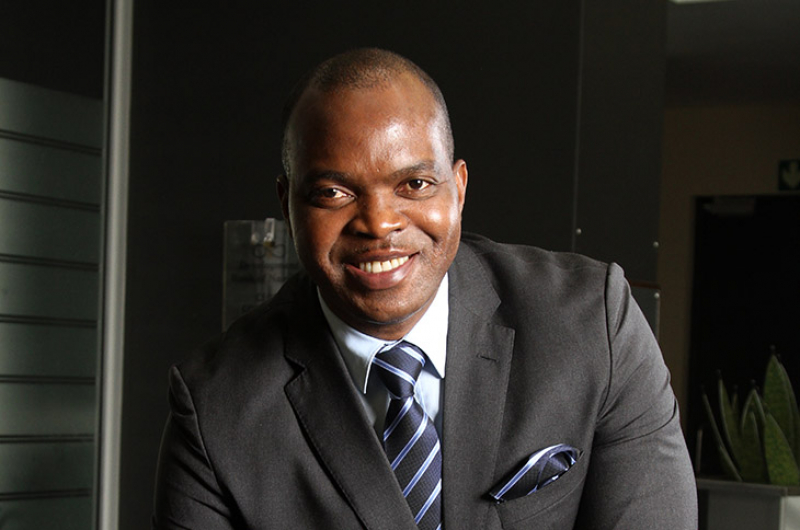 Call 061 290 8000
Call 061 290 8000 Click to mail us
Click to mail us FAQs
FAQs

DBN
On Friday, 25 February 2022, Development Bank of Namibia (DBN) signed an agreement to finance a solar park at Rosh Pinah.
With the latest agreement, DBN’s commitment to the field of renewable energy amounts to N$1.038 billion encompassing finance for 87.9 MW from 13 projects.
Once commissioned, the new power producer, Rosh Pinah Solar Park (RPSP) will generate 5,4 MW for the operational energy requirements of Rosh Pinah Zinc Corporation (RPZC). RPZC is in the process of expanding its operations and will require additional supplies of electricity. The establishment of Rosh Pinah Solar Park is expected to reduce the cost of energy to run the mine, diversify its sources of energy and improve its sustainability.
RPSP is owned and will be managed by two Namibian entities, Otesa Energy Projects, the majority shareholder, and Emesco Energy (Namibia). Otesa Energy Projects will construct the plant and Emesco developed the plant.
In a statement about the solar park, Director and Shareholder, Elmo Kalyamo, said the facility will supply 30% of RPZC’s power requirements over the 15-year duration of the power purchase agreement (PPA). This will reduce RPZC’s emissions of greenhouse gases by 6% annually at a company level. Emissions of CO2 produced by utility supplied power in the //Kharas Region will be reduced by 14,242 tons.
Kalyamo said Rosh Pinah Solar Park greatly appreciates the support of DBN and their responsiveness to the specific financing requirements of the project. He also stated that this majority Namibian-owned project supports the country’s objective of energy independence.
Finance for Rosh Pinah Solar Park is the second renewable energy project financed using the Bank’s Climate Adaptation Facility.
Commenting on the financial and developmental aspects, DBN CEO Martin Inkumbi said the Bank is committed to the development of renewable energy generation, and the benefits that it brings to economic activity and socio-economic wellbeing in Namibia.
Particular development benefits of the finance include preserving sustainability of the Mining and Quarrying sector by reducing costs to a significant producer, making employment offered by RPZC more sustainable, as well as alleviating pressure on the electricity grid.
Pressure on the grid is driven by growing demand from industry as well as expansion of the grid to reach previously unconnected households. As a result of demand outstripping installed generation capacity, Namibia is a net importer of electricity from South Africa and the Southern African Power Pool (SAPP). In December 2021, the country generated 89,054 Megawatt hours (MWh) but had to import 263,899 MWh.
By financing renewable energy generated by Independent Power Producers (IPPs), DBN aims to reduce cashflows out of the country, increase the amount of locally generated electricity, reduce future costs associated with developing and maintaining cross-border transmission infrastructure as well as enhancing security of supply which may be complicated by threat of disruption of export operations.
The Bank has developed a sound track record in financing IPPs generating renewable energy since developing the original industry financing model for Omburu Photovoltaic Park, as well as Ombepo Wind Farm near Lüderitz.
The Development Bank of Namibia (DBN) has responded to the Black Business Leadership Network of Namibia’s (BBLN) petition by stating that it has been and remains responsive to economic challenges faced by entrepreneurs in the country in line with its legal mandate and strategic business objectives.
The Bank proactively responded to the impact of Covid-19 on the economy, and has implemented measures to alleviate the burden of loan repayments, which include:
- Covid-19 Business Relief loans to qualifying enterprises
- Loan restructuring for affected clients
- Loan repayment holidays in the tourism and hospitality sector, which have now been extended through June 2022
- Loan repayment holidays to all SME borrowers at the advent of the first lockdown, from March 2020 to September 2020.
- Extended loan repayment holidays to SMEs on the merit of each business case.
Says DBN CEO Martin Inkumbi, it is imperative to note that DBN has not called up any loan for any business enterprise that was in good standing before the arrival of Covid-19. He adds that the Bank will continue negotiating suitable loan repayment arrangements for borrowers affected by depressed business revenue as a result of Covid-19.
Inkumbi further states that, as a matter of operational policy, the Bank negotiates realistic loan repayment arrangements that suit both the Bank and the borrower. This policy is extended to all borrowers who experience business challenges and is not limited to those affected by Covid-19. The policy, in existence since early in the Bank’s operational history, is designed to preserve the development impact of loans.
However, the Bank reiterates its legal obligation, as an accountable lender of public funds, to recover all money lent out, plus interest charged.
Affected members of BBLN are urged to approach DBN on a case-by-case basis to negotiate possible relief measures.
He adds that the BBLN should not allow itself to be used by borrowers who see it as an opportunity to avoid loan repayment responsibilities. He says the Bank is seeing some businesses that defaulted years before the term Covid-19 was known and collection efforts were already underway. These businesses are now claiming Covid-19 as the problem. BBLN should ideally also advocate good business management practices, and accountability on the part of entrepreneurs, and not demand a blanket cessation of loan collection efforts by lenders. Such demands introduce a new risk factor that lenders now have to consider and discount when lending money.
Inkumbi further comments that adverse macro-economic developments and external shocks to the business environment are bound to occur from time to time, requiring flexibility and agility on the part of lenders and borrowers alike. DBN commits to be responsive to such developments. Where there is a clear recovery or turnaround plan, DBN will and has always come to the table.
However, when a business concept has failed, even taking covid-19 out of the equation, the best response by the entrepreneur is either to change the business concept, or if that is not possible, to close it and invest the capital elsewhere. That is also flexibility and agility.
Inkumbi concludes by saying that the Bank, as a responsible corporate citizen, draws no joy nor comfort in the closure of enterprises in the economy. The Bank is preoccupied with interventions which impact the economy positively.
What is given, gets given back. Jerome Mutumba on mutual responsibilities of lending and borrowing.
Feb 22 2022In the wake of emerging calls for write-offs of loan repayments for small and medium enterprises issued with the purpose of enhancing Namibia’s development, economic activity and prosperity, DBN Executive for Marketing and Corporate Communication Jerome Mutumba, has amplified important aspects of mutual responsibility for lending and borrowing, which must be factored into the concept of development finance.
Mutumba explains that there is a distinction between finance for development and commercial finance. Finance for development will be allocated with the goal of supporting and enhancing economic activity, while commercial finance in the main will have the goal of achieving returns for the lender, without the natural preoccupation to impact development. Both, however, will have the prerequisite of returns on capital, in order to sustain their operations. In the event of loans which are not repaid, both development and commercial finance will fail.
In making the choice between sources of commercial or development finance, the borrower will envisage the same outcome, regardless of the source of finance: a viable enterprise that will be a source of financial growth and income. The choice of lender, on the other hand, may influence the terms of the loan in favour of the borrower. A development finance institution (DFI) may, for instance, accept a greater degree of risk, offer capacity development services to borrowers and offer flexibility on repayment.
In order to qualify for a DFI loan, the borrower has to recognise the goals of development finance, and ensure that she or he can fulfil those requirements. The first cut decision of development finance will be a clear indication that the borrower can satisfy the terms of the loan. If not, the borrower will not be able to satisfy the DFI’s development goals, such as employment, development of capital, economic activity and other factors.
As a lender, the DFI will have the additional consideration of its own sustainability. It has the moral, patriotic and economic obligation to preserve its own capital, as well as collect interest, which will be used to sustain and grow its operational capacity, by providing more loans to a greater number of borrowers. What is given, gets given back, Mutumba emphasizes. In case of DBN, the Bank endeavours to recover all public money that it lends out.
Mutumba also points out that as the benefits of development finance are allocated from a common national resource, with the broader goals of development impact that extends beyond the owner and the DFI. Both the lender and the borrower must hold themselves responsible.
However, Mutumba says when enterprises do experience difficulty, this is rapidly identified by the Bank, at which stage the Bank will approach the borrower to examine the source of the business challenge and try to rectify the situation, rather than immediately call up the debt and recover it through a legal process.
He illustrates the point using the Covid-19 measures implemented by the Bank. Once the impact of Covid-19 became clear the Bank rapidly implemented repayment holidays and extended loan repayment periods to reduce the monthly debt burden on SMEs as well as tourism and hospitality borrowers. It subsequently launched Covid-19 Business Recovery Loans.
Mutumba concludes by saying that when the Bank has in a few instances experienced difficulty with loans, it is often as a result of a number of factors, but mainly attributable to a lack of administrative skills and capacity from the side of the entrepreneurs. The Bank, he says, has taken steps to rectify this with the implementation of a Mentoring and Coaching Unit which provides capacity building in the form of mentorship and coaching, through a network of experts in various fields on business management.





